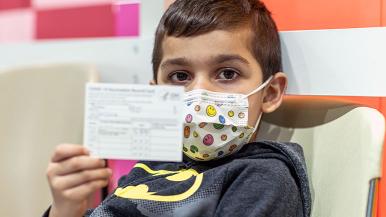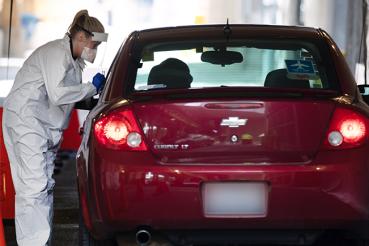Since the start of the pandemic, about 8.5 million children in the United States have tested positive for COVID-19, and nearly 11% of those cases occurred just in the past two weeks, according to the American Academy of Pediatrics. The highly contagious omicron variant is to blame for the rise in COVID-19 cases among children here in Chicago and the rest of the country.
Getting your child or teen up to date on their COVID-19 vaccines (meaning fully vaccinated and boosted if they are eligible) can help protect them against severe disease caused by the omicron variant, says Rush pediatric infectious disease specialist Latania Logan, MD, MSPH.
“With the kids that we’re seeing in the hospital right now with omicron, almost all of them are unvaccinated,” Logan says. “Some of these children are under the age of 5, and there’s no vaccine available for them.”
The Centers for Disease Control and Prevention recommends that everyone ages 5 and older get vaccinated against COVID-19. For kids ages 5 to 11, that means getting two doses of the Pfizer-BioNTech vaccine. (The CDC also now recommends that kids ages 5 to 11 who are moderately to severely immunocompromised receive a third primary dose of the vaccine 28 days after their second dose.)
Here, Logan shares five important facts to know about young people and the COVID-19 vaccine.
1. The vaccine is safe and effective for kids.
Now that more than 22 million kids ages 5 to 17 have had at least one dose of the COVID-19 vaccine, real-world data confirms what the clinical trials showed: Vaccines are safe and effective and can help protect your child against the latest omicron variant.
“If your child just had their two-dose primary series of the vaccine or the booster, they have high enough antibody levels to protect against severe disease caused by the omicron variant,” Logan says.
Data also shows the vaccines are safe. “The CDC recently released real-world data on the vaccine’s safety in 5- to 11-year-olds as reported by their caregivers and clinicians in the Vaccine Adverse Event Reporting System (VAERS) and in v-safe (a reporting tool) by parents and caregivers,” Logan says. “What they found is that, just like in the trials, the kids are doing extremely well, even better than the adults. Specifically, out of almost 9 million doses given to kids, approximately 98% of the side effects from the vaccine that were reported were mild and not serious.”
The most common side effects reported were pain at the injection site, which lasted a day or two, as well as fatigue and headache. Only 8% of kids had a fever after the first dose, and about 13% had a fever after the second dose.
“The vast majority of kids did not have any disruption of their normal life or have to miss school after their vaccines,” Logan says. “So, we know that vaccines work and they are safe.”
Logan also explains that long-term effects are unlikely based on how the vaccine works. “The mRNA (the technology used in the vaccine) delivers the information, so your body can start making antibodies, and then it degrades,” she says. “There is no way for mRNA to affect your DNA, and it does not go inside your cells where the DNA is located.”
Logan also stresses that there is no evidence that the vaccine causes long-term effects like infertility, a common COVID-19 vaccine myth.
“There is absolutely no basis to this myth that the vaccine causes infertility,” Logan says. “This false information has been perpetuated primarily by the anti-vaccine community, and it is completely unfounded. We have also been following pregnant women who have received the vaccine, and they are delivering healthy infants. There have not been any increases in preterm births or miscarriages in these vaccinated people.”
2. COVID-19 can be serious in children.
During the current omicron surge, some children have been getting very sick. This was also true during earlier periods of the pandemic when other variants were dominant. Although deaths from COVID-19 are much less common in children than in adults, COVID-19 remains one of the top 10 causes of death among children.
A key concern is multisystem inflammatory syndrome in children, or MIS-C, a rare and sometimes fatal condition that can develop after a child has been infected with the coronavirus.
“In previous surges, we have seen an increase in children who are otherwise healthy come to the hospital with MIS-C, and it can be devastating to families,” says Logan. Although it’s not clear which kids will develop MIS-C, Black and Latinx children have a higher risk compared with white children. But white children and children of other racial and ethnic backgrounds are also getting MIS-C.
Logan says she has also seen kids who may have had mild symptoms of COVID-19 go on to develop long-term symptoms, like brain fog. “It is heartbreaking to see what these children and their families go through. You do not want that for your child,” she says.
“While we don’t know exactly who will get ill from COVID-19, who will develop MIS-C, who will need to be hospitalized or who will develop long-term symptoms, we do know that the vaccine will protect children from all of those possibilities,” Logan adds. For example, a recent CDC study found that the Pfizer-BioNTech vaccine is highly effective in preventing MIS-C in teens.
3. The vaccine for kids younger than 5 is still being tested but could be available this spring.
Clinical trials for the Pfizer-BioNTech COVID-19 vaccine started with the adult age group to make sure it was safe and effective. Once that was established, the manufacturer moved into step-down trials with kids.
The trials found that the same adult dose of the Pfizer-BioNTech vaccine was safe and effective for adolescents 12 and older. For kids ages 5 to 11, the trials found that one-third of the adult dose was safe and effective. These are approved doses available to kids and teens today.
For children ages 6 months to under 5 years, Pfizer tested a dose that was one-tenth of the adult dose but it didn’t generate the same robust response after two doses as they were seeing with the larger dose in older kids, Logan explains. The company decided to test a third dose to see if kids will mount a stronger immune response. Pfizer expects that data will be ready this April. So, the earliest that the vaccine might be available for kids younger than 5 is the second quarter of this year, Logan says.
4. Vaccinated kids and boosted teens (and adults) will bring us closer to the end of the pandemic.
Right now, only one-quarter of kids ages 5 to 11 have received at least one dose of the vaccine, and about half of young teens ages 12 to 17 are fully vaccinated, according to the American Academy of Pediatrics.
“We will see the world get closer to returning to normal once we get more kids vaccinated because we’ll be closer to reaching the level of herd immunity that we need,” Logan says. “As more kids get vaccinated, more things will be possible for all of us.”
And if you have young teens at home, getting them boosted if they are eligible will also bring them up to date and help us fight COVID-19, Logan says. According to the CDC, anyone ages 12 and older should get a booster if they completed their Pfizer vaccine series at least five months ago.
But even if your kids are vaccinated, it is important to continue taking safety precautions, especially with the highly transmissible omicron variant. “We still need to be mindful that we have not reached herd immunity yet,” Logan says. “You still want to avoid crowded spaces, wear a well-fitted mask and practice social distancing.”
5. The vaccine is the best way to protect kids.
Even though many adults were eager to get the vaccine themselves, they may still be hesitating when it comes to getting their kids vaccinated. But given the clear data about the vaccine’s effectiveness and safety — and the troublesome surge of pediatric COVID-19 cases — the vaccine is the best way to protect your kids, Logan says.
Even if your kid already developed COVID-19, Logan still recommends getting them vaccinated. “In the pandemic, we’re seeing people getting reinfected with the new variants like omicron. What we’ve discovered is that prior infection does not protect you or your child against reinfection with this COVID-19 variant. But if you or your child had COVID-19 and you get your vaccine, then you get really great levels of antibodies that offer protection against having severe disease from COVID-19,” she says.
Logan encourages parents to trust the science and get their children protected. “I get it: You want to do what’s best for your child. I can tell you this is what’s best for your child,” she says. “Speaking as a parent, I took my 8- and 10-year-old kids to get vaccinated as soon as the vaccine was approved by the CDC advisory committee for their age group. I trust these vaccines, and I feel that it is important to protect my kids. The benefit is so great that there is no good reason not to get our kids protected.”
Now is the best time to get your child vaccinated and boosted if they are eligible. Learn more about the vaccine and how to schedule an appointment now.




